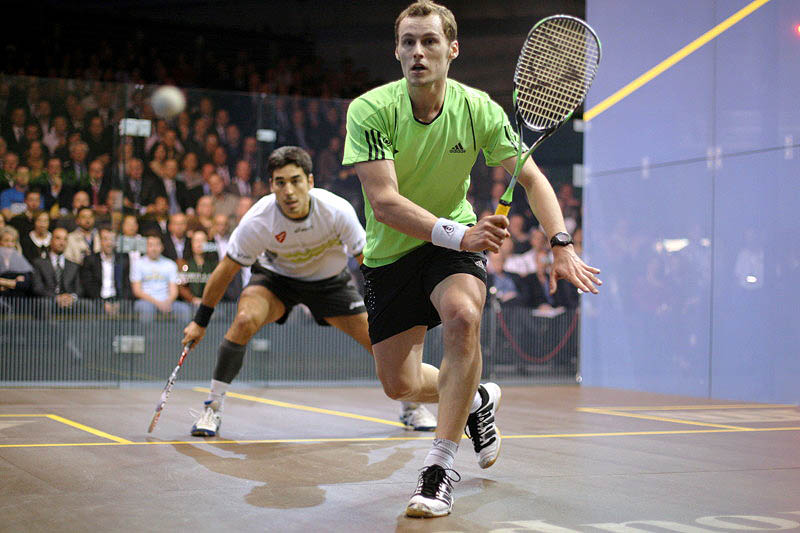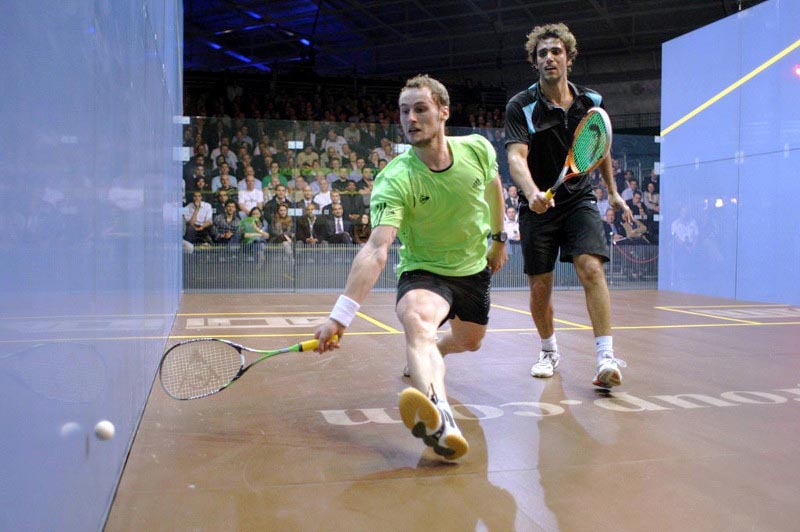
By Richard Eaton
Photos by Steve Line/SquashPics.com
Without wishing to bore you with tales of arcane protocol by the British, it was quite an insight to see the different reactions to Gregory Gaultier determinedly kissing the Duchess of Gloucester on both cheeks. That isn’t the sort of thing royalty expects, even in these difficult times.
It hinted at why Gaultier, with his challenging, amusing, sometimes arrogant and occasionally infuriating ways, and with his tendency to mix mind-opening irreverence with impulsive gaffes, may yet possess enough special gifts to become world champion.
The unscheduled embrace took place at the prize-giving at the Super Series finals in London, and in a way symbolized something about squash too—unafraid to invade new territory, creating a more upmarket image, and breaking down barriers.
Those with longer memories recall how Manuel Santana tried to kiss Princess Alexandra’s hand while about to receive the Wimbledon men’s singles trophy, only to see her withdraw it before such outrageous intimacy could occur.
There was no such escape for the Duchess. She was confined within a demountable court, time-travelled into the exclusive 19th century Queens Club in London’s Barons Court, and she was unable to step back.

She was also trapped by the occasion’s emotional nexus, created mostly by Gaultier, with his intense passions, noisy appeals, and over-the-top celebrations, which included stealing the microphone from Robert Edwards, the master of ceremonies, for the third time that week.
The best course was for her to accept it, which she did with barely a blink. After all, he was only a Frenchman, wasn’t he? It was fairly easy to pretend he didn’t know about such things. But he almost certainly did.
Gaultier was also aware that he has improved. By how much, he is less sure. Here he looked the best player in the world from start to finish. At times he appeared to feel he was able to do anything. He had a new team around him, had worked hard for many weeks, and had developed his state of body and mind conspicuously.
His ability to mix the short and the long games, his capacity to switch from defense to attack and back again with disorienting fluidity, the speed with which he could accelerate the rallies when his opponent was weakening—all these were greater than before.
His main fault, a combustible temperament, was at least being partially channelled with regular input from what he calls his mind coach. It may be best not to rein it in too much, though, for it is this which also helps make Gaultier special.
It was a nicely judged mixture of self-expression and discipline that helped him win an open match of four games against David Palmer; it was his impudence that helped turn around a contest he might have lost against Karim Darwish, the World No. 1; it was his ability to avoid fratricidal emotions and raise his level in the second half of the match, which carried him unstoppably to victory against Thierry Lincou, once like a substitute brother, in the final.
So pleased was Gaultier with himself after his 11-5, 8-11, 11-5, 11-5 victory that noone would have been surprised had he kissed his opponent too. In fact, the two Frenchmen did embrace, first inside the court and then outside, gestures no doubt intended to complete the healing from their Super Series finals fracas ten months previously at London’s Broadgate arena.
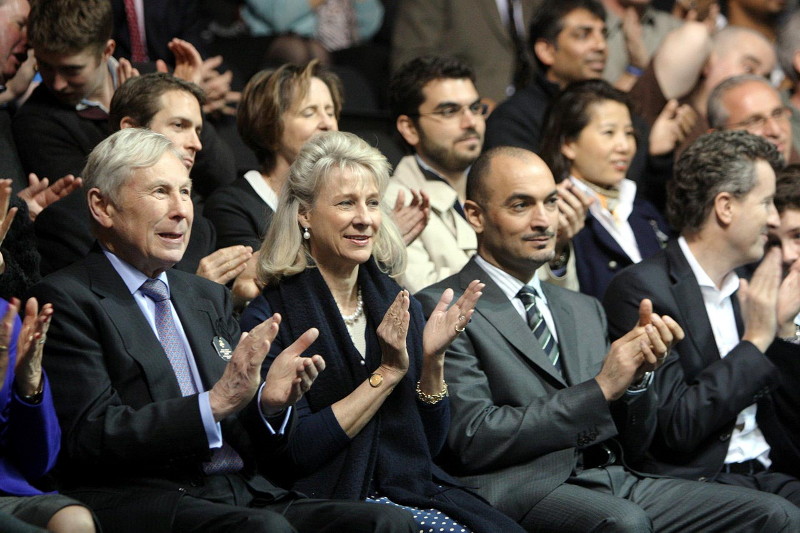
Then Gaultier had said: “Thierry is like my big brother,” and Lincou had bellowed from his courtside chair, “not any more!” Now it was all touchy-feely.
One wondered though how Darwish had felt about Gaultier the day before. The top seed had turned a 1-6 third game deficit into an 8-6 lead against the champion, only for Gaultier to walk off court for four minutes after taking a glancing blow to the head. When he returned, Darwish’s momentum had completely gone. Gaultier won five of the next six rallies, the third game with a lucky back wall nick, and eventually the match by 10-12, 11-5, 11-9, 11-7.
There were plenty of other controversial incidents involving Gaultier, too. Against Palmer, a ball was called down and then up, bringing first Gaultier and then Palmer out of court to complain noisily. Perhaps beginning to wonder if the match could ever be re-started, the referee eventually asked Gaultier if he would consider playing a “let,” and the reply of “no” was so forcible that spectators burst out laughing. At least that helped disperse the tension.
And in the final, there was one occasion when Gaultier was out of the court again, arguing with officials—with Lincou standing behind him, miming a motormouth with his fingers.
Gaultier is quite reminiscent of Jonathon Power, the former World No. 1 Canadian, who is also his friend. Whether the Frenchman can emulate the Canadian by reaching No. 1 will be fascinating to see, though it may require Gaultier to become as good as Amr Shabana’s best.
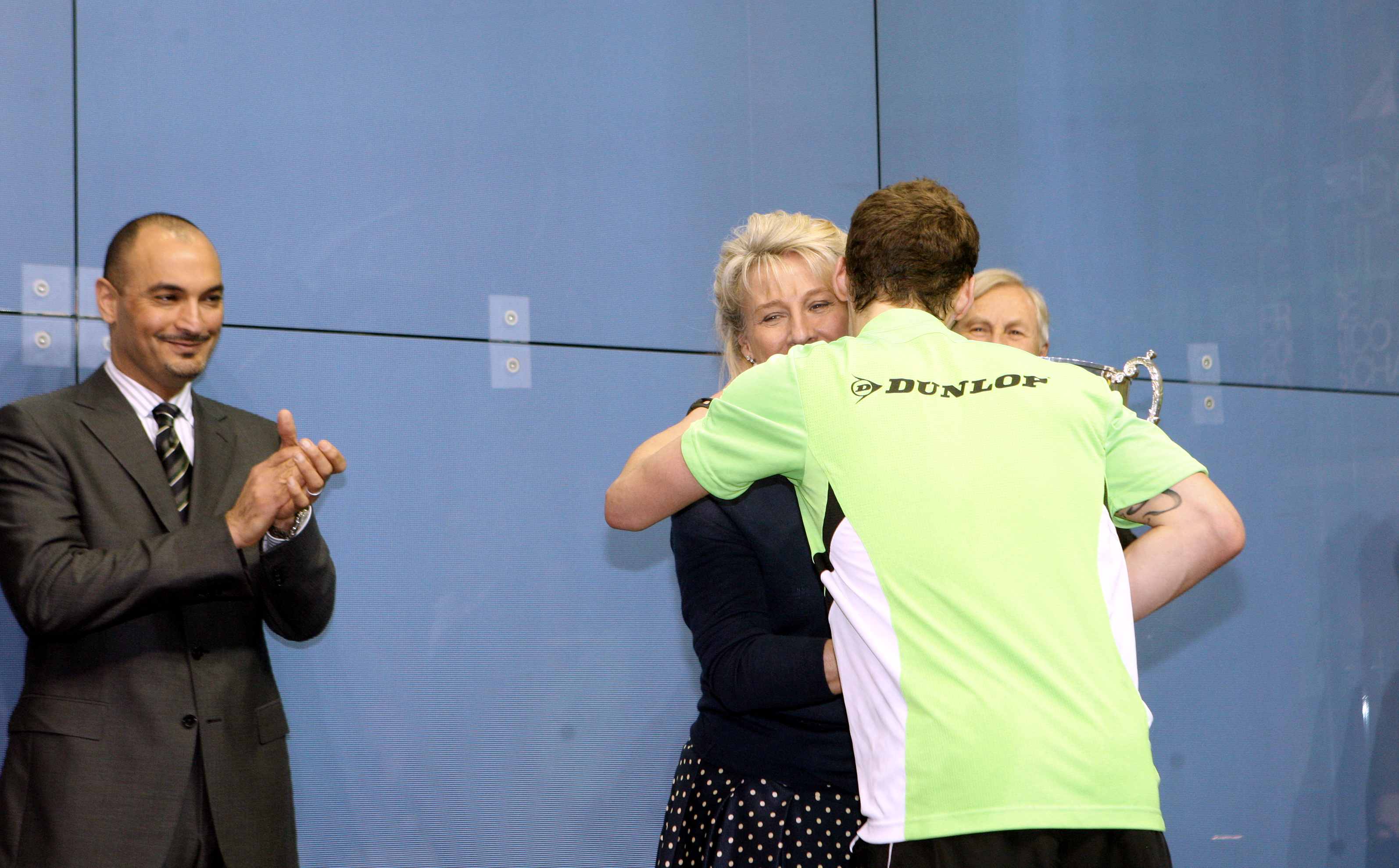
The Egyptian made clear that this level was something he intended to recover. “When you have been No. 1 for 33 months and lose it, you realize then that you miss it,” Shabana said after his disappointing start, a limp, straight-games loss to Lincou.
His revival against the unlucky James Willstrop was certainly brilliant, after which Shabana reiterated a belief that there was little wrong with his injured knee and that all he really lacked was quality match practice.
The truth of this assertion was difficult to check, for in the final round of group matches, his opponent, Ramy Ashour, the world champion, appeared only half there, while in the third place play-off, Shabana conducted little more than an exhibition against Darwish, another compatriot.
Despite finishing in fourth place, Darwish did look as though he had gone to another level since becoming World No. 1 at the start of the year. So did Ashour—though in the other direction.
Although the young Egyptian played a good opening match in a four-game loss to Willstrop, he has surely never been as down in the dumps quite so much as during these four days. As well as suffering three defeats in three matches, he was the only player refusing to come on court for an interview at any stage.
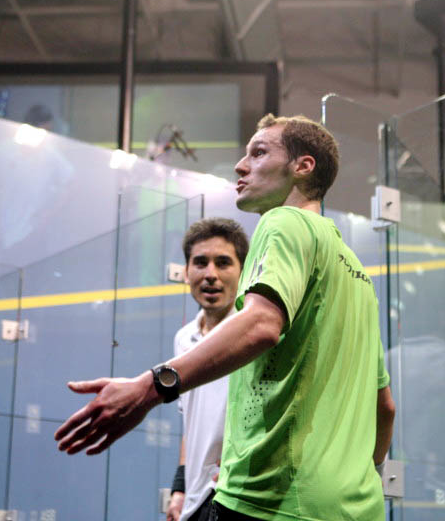 What was wrong? Was it the pressure heaped on him since winning the World Open in October? Maybe. Will he recover? Probably. He is still only 21. Gaultier is 26, and may need to make the most of his current surge.
What was wrong? Was it the pressure heaped on him since winning the World Open in October? Maybe. Will he recover? Probably. He is still only 21. Gaultier is 26, and may need to make the most of his current surge.
Shabana failed only narrowly to qualify for the final in a group in which three men won two matches—but Willstrop even more narrowly failed. Had the Englishman beaten Lincou in three straight games in the final group match he would have qualified, but after winning the first two games, Lincou fought back with prolonged tenacity and took the match to five.
It was surprisingly prolonged, since Lincou needed only one game to qualify for the final, but apparently thought he needed to win two. There appeared to have been no printed version of the qualifying criteria in this new format, and agreement on what it should be seemed to have come only after the finals had started.
This contributed to the confusion Lincou experienced while playing his penultimate match, in which he ran like a crazy rabbit for 20 or 30 minutes longer than he needed. Although this is a bright new, younger, and more optimistic era for the PSA, it needs to avoid naïveties like this.


